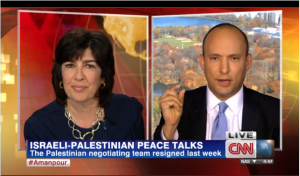 Israel’s Economy Minister Naftali Bennett took CNN’s Christiane Amanpour to task in a tense television interview on Monday, objecting to the anchor’s insistence on referring to “occupied territories,” to which the leader of Israel’s Jewish Home party responded flatly, “One cannot occupy his own home.”
Israel’s Economy Minister Naftali Bennett took CNN’s Christiane Amanpour to task in a tense television interview on Monday, objecting to the anchor’s insistence on referring to “occupied territories,” to which the leader of Israel’s Jewish Home party responded flatly, “One cannot occupy his own home.”
The comment was in response to her question about the wisdom of Construction and Housing Minister Uri Ariel’s recent announcement for plans to build 24,000 housing units beyond the Green Line, in the “occupied territories,” a move which Prime Minister Binyamin Netanyahu ordered to be reversed so as not to interfere with parallel negotiations to stop Iran’s nuclear program.
“First of all Christiane, you talk about ‘occupied,’” Bennett said, before Amanpour interrupted him, trying to steer him back to the question of the housing developments.
“Since you say the term ‘occupied,’ I have to point out, I’m holding a coin here from Jerusalem,” he said, lifting the coin up to the camera, before she cut him off, again, insisting, “It’s an international term, Mr. Bennett.”
“I know,” Bennett said, “and I don’t accept it. Because this coin which says in Hebrew, Freedom of Zion, was used by Jews in Jerusalem 2,000 years ago in the state of Israel in what you call occupied [land]. One cannot occupy his own home.”
“Now to your question, in Israel, beyond the Green Line, there are 700,000 Israelis, there’s vast cities, and they need to live, and we have always said that we will continue to serve this population,” Bennett said.
“The building of communities there is not a hindrance to peace. Only 7% of the entire West Bank, or Judea and Samaria, is built today, 93% is open, so no-one is stopping peace,” he said.
“If the Palestinians want peace, they have to do one simple thing: recognize Israel as the Jewish homeland, that’s all. But if they don’t do that, if they don’t recognize Israel as the Jewish homeland, they can’t expect peace.”
Israel’s Jewish Home party objects to the term “occupied territories” because Israel’s enemies use the phrase to paint it as a colonial power.
In its platform, the Jewish Home party points out that neither the military occupation of Gaza by Egypt nor the military occupation of Judea and Samaria and East Jerusalem by Jordan ever prompted the PLO to demand sovereignty, nor were they ever internationally condemned as foreign occupiers.
Earlier on Monday, Bennett had told a boardroom full of investors in New York City, that rather than waste time negotiating with the Palestinian Authority for an outcome that will be ultimately refused, no matter the terms, he has been using his post as Economy Minister to focus on growth: “I call Israel a lighthouse in a storm. There is a regional Arab storm that will last for years, but Israel is strong and radiates light. This is the true story of Israel. Not discussing the conflict all day, instead, projecting light like a lighthouse and doing good around the world.”
He echoed that sentiment in the interview with Amanpour, telling the anchor that his party’s solution focused on “bottom up development,” providing tangible benefits rather than nationalistic rhetoric.
“What we need to do with the Palestinians, because we are neighbors, is build it bottom up,” Bennett said.
“We need to invest in the economy, we need to invest in more joint businesses. The situation on the ground is very positive.”
“I think trying to enforce an artificial state in the heart of Israel, in Jerusalem, is a grave mistake,” Bennett told Amanpour.
Watch Bennett’s interview on CNN below as he confronts Amanpour at 7:27:









